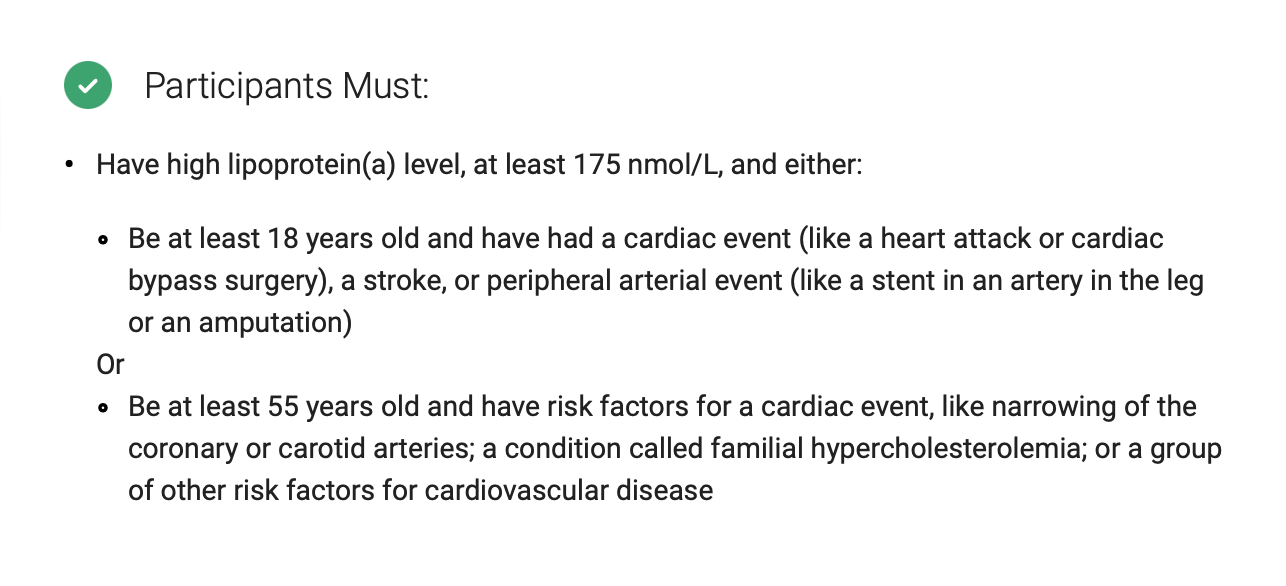If You Have High Lipoprotein (a) Consider Enrolling in this Trial
A clinical trial of lepodisiran which has been shown to lower Lp(a) levels by up to 94% is under way
This is a quick post to notify individuals with high lipoprotein(a) levels of a clinical trial of lepodisiran that they may qualify for.
I’ve written in detail about the hidden risk of lipoprotein(a), (aka Lp(a)), here and here. If you or family members have developed atherosclerotic complications at an early age you need to be tested for it.
Briefly, Lp(a) is the strongest single inherited (monogenetic) risk factor for the early development of coronary artery disease, heart attacks and strokes. It is not routinely tested for in the standard cholesterol or lipid panel (although it should be.)
Although effective therapies exist to reduce the risk of heart disease by lowering LDL cholesterol and apolipoprotein B, we don’t have any approved drug treatments to lower Lp(a). Since Lp(a) levels are genetically determined, lifestyle changes (diet or exercise) generally have no effect.
A recent trial showed that a single injection of Eli Lilly’s small interfering RNA (is RNA) drug, lepodisiran lowered lipoprotein(a) levels by as much as 96% within two weeks and maintained levels more than 94% below baseline for 48 weeks.
Eli Lilly is now enrolling patients into a trial to look out whether this dramatic reduction in Lp(a) results in significant reductions in heart attack, stroke and cardiac death in a study entitled “A Phase 3, Randomized, Double-Blind, Placebo-Controlled Study to Investigate the Effect of Lepodisiran on the Reduction of Major Adverse Cardiovascular Events in Adults with ElevatedLipoprotein(a) who have Established Atherosclerotic Cardiovascular Disease or Are at Risk for a First Cardiovascular Event – ACCLAIM-Lp(a).”
Here are the inclusion criteria:
You can find local study locations and answer a brief questionnaire to see if you qualify here.
If you want more information or have questions put them in the comments and I’ll do my best to answer them. A St. Louis patient of mine was recently enrolled via a site in St. Peters, MO and has shared with me her experience thus far.
Here’s a press release from the Cleveland Clinic on the trial showing dramatic reductions in Lp(a) with lepodisiran.
Acclaimingly Yours,
-ACP
N.B. Hopefully it goes without saying that I have no ties whatsoever to Eli Lilly and that I stand to gain nothing from this trial.





Fascinating and I’m glad they are doing the trials. Are the primary outcomes patient-centered (like reduction in ASCVD events)?
The whopping >90% reduction strikes me as too much, but that’s just a knee jerk reaction. I AI’d this (made up that verb just now) and here is what I get as an answer to the question of whether Lp(a) has any beneficial properties in the body. If it does, then such near total reduction might not be good for overall outcomes besides ASCVD?
Quote:
Lipoprotein(a), often abbreviated as Lp(a), is a complex particle in the blood that has been the subject of much research in recent years:
1. What the body uses Lp(a) for:
The exact physiological role of Lp(a) in the body is not fully understood. However, it's believed to have some functions related to:
- Blood clotting: Lp(a) may play a role in the coagulation process and wound healing.
- Tissue repair: It might be involved in delivering cholesterol to sites of tissue injury for cell membrane repair.
- Immune function: Some research suggests it may have a role in innate immunity.
2. Beneficial properties:
While Lp(a) is often discussed in terms of its potential negative effects on cardiovascular health, there are some potentially beneficial aspects:
- Antioxidant properties: Lp(a) contains enzymes that may help reduce oxidative stress in the body.
- Wound healing: Its potential role in tissue repair could be beneficial for wound healing processes.
- Evolutionary advantage: The fact that Lp(a) has been conserved through evolution suggests it may have had some survival benefit, though this is still debated.
It's important to note that while these potential benefits exist, high levels of Lp(a) are generally considered a risk factor for cardiovascular disease. The balance between its potential beneficial and harmful effects is still an active area of research.
My understanding is that a similar medication, Pelacarsen, may be available as early as next year. But if you enroll in the trial, you have a 50% chance of being locked into the placebo group for 4 to 5 years. Arguably, you may be better off just waiting to see what happens with Pelacarsen.